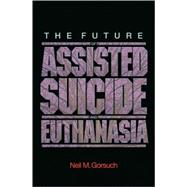
The Future of Assisted Suicide & Euthanasia in America
by Gorsuch, Neil M.Rent Textbook
Rent Digital
New Textbook
We're Sorry
Sold Out
Used Textbook
We're Sorry
Sold Out
How Marketplace Works:
- This item is offered by an independent seller and not shipped from our warehouse
- Item details like edition and cover design may differ from our description; see seller's comments before ordering.
- Sellers much confirm and ship within two business days; otherwise, the order will be cancelled and refunded.
- Marketplace purchases cannot be returned to eCampus.com. Contact the seller directly for inquiries; if no response within two days, contact customer service.
- Additional shipping costs apply to Marketplace purchases. Review shipping costs at checkout.
Summary
Table of Contents
| Acknowledgments | p. xi |
| Introduction | p. 1 |
| The Glucksberg and Quill Controversies: The Judiciary's (Non)Resolution of the Assisted Suicide Debate | p. 8 |
| The Washington Due Process Litigation | p. 8 |
| The New York Equal Protection Litigation | p. 11 |
| The Final Battle? The Supreme Court Does (and Does Not) Decide | p. 14 |
| The Aftermath of Glucksberg and Quill | p. 17 |
| The Debate over History | p. 19 |
| Which History? | p. 20 |
| The Project | p. 22 |
| The Ancients | p. 22 |
| Early Christian History | p. 25 |
| English Common Law | p. 28 |
| Colonial American Experience | p. 29 |
| The Modern Consensus on Suicide and Its Assistance | p. 30 |
| The Euthanasia Movement | p. 33 |
| Prevailing Law Today | p. 43 |
| Conclusion | p. 46 |
| Arguments from Fairness and Equal Protection: If a Right to Refuse, Then a Right to Assisted Suicide? | p. 48 |
| An Act/Omission Distinction? | p. 49 |
| A Causation-Based Distinction? | p. 51 |
| Toward an Intent-Based Distinction: The Insight of the Double Effect Principle | p. 53 |
| Some (Initial) Arguments against Double Effect: Conflating Intent and Foresight | p. 57 |
| Distinguishing Suicide, Assisted Suicide, and Euthanasia from the Right to Refuse: Intending versus Foreseeing Death | p. 62 |
| Some (Additional) Criticisms of Double Effect as Applied to the Assisted Suicide Debate | p. 69 |
| Conclusion | p. 75 |
| Casey and Cruzan: Do They Intimate a Right to Assisted Suicide and Euthanasia? | p. 76 |
| The "Reasoned Judgment" Test and Its Critics | p. 76 |
| Casey-Based Arguments | p. 79 |
| Cruzan-Based Arguments | p. 82 |
| Conclusion | p. 84 |
| Autonomy Theory's Implications for the Debate over Assisted Suicide and Euthanasia | p. 86 |
| The Autonomy Debate | p. 86 |
| The Neutralist View of Autonomy | p. 87 |
| The Harm Principle's Competing View | p. 89 |
| Perfectionism and Autonomy | p. 90 |
| The Implications of Autonomy Theory for the Assisted Suicide and Euthanasia Debate | p. 93 |
| Legalization and the Law of Unintended Consequences: Utilitarian Arguments for Legalization | p. 102 |
| The Dutch Experience: "Virtually Abuse-Free"? | p. 103 |
| The Oregon Experience: An "All-Too Conscientious" Statutory Regime? | p. 115 |
| Legalization and Other Unintended Consequences | p. 125 |
| Decriminalization as a "Costless" Enterprise? | p. 132 |
| How to "Balance" the Costs and Benefits of Legalization? | p. 138 |
| Conclusion | p. 141 |
| Two Test Cases: Posner and Epstein | p. 143 |
| Posner's Utilitarian Case for Assisted Suicide | p. 143 |
| Posner's and Epstein's Libertarian Case for Assisted Suicide | p. 152 |
| An Argument against Legalization | p. 157 |
| The Inviolability of Human Life | p. 157 |
| What Does It Mean to Respect Human Life as a Basic Good? | p. 163 |
| Some Objections | p. 167 |
| The Future of the Oregon Experiment? | p. 176 |
| Toward a Consistent End-of-Life Ethic: The "Right to Refuse" Care for Competent and Incompetent Patients | p. 181 |
| The Inviolability of Life and the "Right to Refuse" for Competent Persons | p. 182 |
| The "Right to Refuse" and Infant Patients | p. 191 |
| The "Right to Refuse" and Incompetent Adult Patients | p. 204 |
| Conclusions | p. 215 |
| Epilogue | p. 219 |
| Certain American Statutory Laws Banning or Disapproving of Assisted Suicide | p. 227 |
| Statistical Calculations | p. 229 |
| Notes | p. 231 |
| Bibliography | p. 285 |
| Index | p. 303 |
| Table of Contents provided by Ingram. All Rights Reserved. |
An electronic version of this book is available through VitalSource.
This book is viewable on PC, Mac, iPhone, iPad, iPod Touch, and most smartphones.
By purchasing, you will be able to view this book online, as well as download it, for the chosen number of days.
Digital License
You are licensing a digital product for a set duration. Durations are set forth in the product description, with "Lifetime" typically meaning five (5) years of online access and permanent download to a supported device. All licenses are non-transferable.
More details can be found here.
A downloadable version of this book is available through the eCampus Reader or compatible Adobe readers.
Applications are available on iOS, Android, PC, Mac, and Windows Mobile platforms.
Please view the compatibility matrix prior to purchase.
